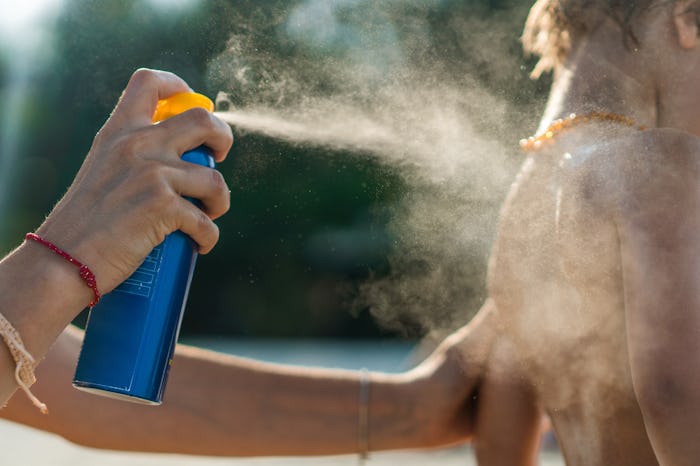Fun in the Sun

Can I Use Spray Sunscreen On My Kids, Or Must I Keep Packing Three SPFs?
The beach bag just needs to be lighter.
Towels, sunglasses, snacks, waters, toys, life jackets, and good lord don’t forget the sunscreen, all eight bottles. The baby needs mineral lotion, but you and your partner like the spray, and then there’s the kids’ bottle too. If you’re trying to consolidate for the summer, or you find it easier to chase your kid and spray them down instead of gripping their lotion-y arms while they try to wriggle free, you’ve probably wondered: are spray sunscreens safe for kids? Pediatricians say any sunscreen is better than none, but if you have the ability to pick and choose, they’d steer you back to lotion SPF every time.
Are spray sunscreens safe for babies, toddlers, and kids?
For babies 6 months and younger, the American Academy of Pediatrics (AAP) recommends just keeping them out of direct sunlight altogether, so stick to the shade. This is because young infants are more likely to experience side effects (like rashes) from sunscreen than older kids and adults, says Dr. Darby McElderry, M.D., pediatrician at Children’s of Alabama.
As for any kids older than 6 months, SPF is a must, and pediatricians recommend using a lotion. “Both spray and lotion sunscreens are safe to use as long as you are using them correctly, choosing the right SPF level, and applying the proper amount, but generally speaking, lotion is preferable over spray sunscreen,” McElderry says. “Lotions don’t contain propellants and chemicals like spray sunscreens do that are not meant to be inhaled at all.”
“Sunscreen sprays are most often made with chemical ingredients. They also contain propellant chemicals, which are irritating and should not be inhaled by babies and children. There was a large recall of various sunscreens due to contamination issues in the summer of 2021. The majority of them were sprays. I view this as another reason to choose a zinc oxide cream when in doubt,” says Dr. Alexis Monique Javier, D.O., pediatrician with Children’s Memorial Hermann Pediatrics.
Studies have shown that some of the common chemicals found in sunscreens — like oxybenzone, avobenzone, and homosalate — can be absorbed through the skin and found in the blood after just one application, Javier says. The U.S. Food and Drug Administration (FDA) has made it clear that further research is needed to determine whether or not absorbing those chemicals has the potential for long-term effects on health.
That said, both doctors agree that any sunscreen is better than no sunscreen. Apply what you have to prevent sunburn right now, and you can be choosy about what you buy next time you’re at the store. Be sure whatever you buy — lotion or spray — is labeled as a broad spectrum sunscreen, meaning it protects the skin from both harmful UVA and UVB rays. The American Academy of Dermatology recommends using a sunscreen with SPF 30 or higher, applied at least 15 minutes prior to sun exposure, and reapplied frequently while outdoors (especially after sweating or swimming).
Applying spray sunscreen safely
You should never spray your child (or yourself) directly in the face with sunscreen, McElderry says. If you don’t have lotion SPF to use on the face, spray the sunscreen onto your hands and rub it on the entire face. You should apply enough to see that glistening effect, McElderry says, to ensure there’s enough product on the skin to offer maximum protection.
As for the body, McElderry advises only using spray sunscreen in well-ventilated, non-windy environments — again, you want to minimize the amount your kid might inhale or have land in their eyes or mouth. Hold the nozzle close to their skin and spray generously (most people need about an ounce of product to cover their whole body), and then rub it in to ensure you haven’t missed a spot.
In short: spray sunscreen is better than no sunscreen, and is much safer when you apply it carefully in ways that help your child not inhale a bunch of it. But, if you want the safest sunscreen option where you don’t have to worry about chemical absorption of any kind, mineral-based lotions are for you.
Experts:
Dr. Darby McElderry, M.D., pediatrician at Children’s of Alabama
Dr. Alexis Monique Javier, D.O., pediatrician with Children’s Memorial Hermann Pediatrics